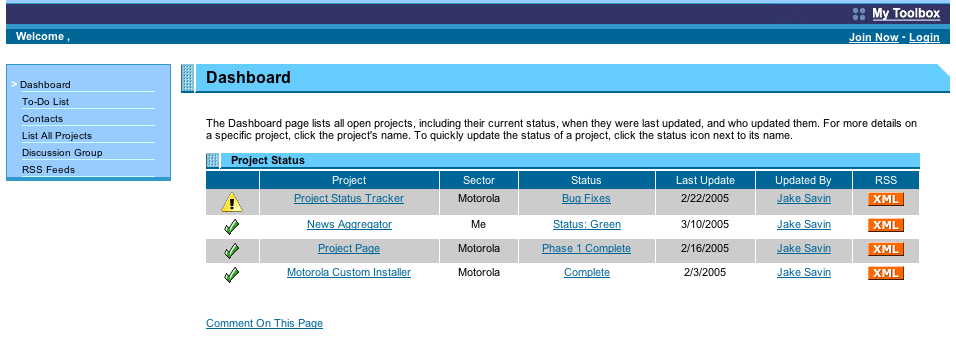David was kind enough to pass the link to me via email. (Actually, I would have found it in the aggregator anyway, but email turned out to be just fine.)
I found the conversation he had with Ross Mayfield (SocialText) to be helpful in offering advice to someone navigating what David referred to as the high "noise level in the enteprise e-mail, blogging, wiki-ing, and collaboration spaces." It is indeed difficult for people to parse through the "overlapping" nature of these applications.
I also have to admit up front that I donít have any problem recommending SocialText if someone is looking for a wiki. ;-)
Anyway, the threadlog struck a chord. A few days ago I had a discussion about the nature and definition of blogs and the role they fill in communication and collaboration within various organizations from schools to corporations that turned the defiinition on its ear for me. The person I was talking with commented "Öwhat (you) do with Manila is not really a blog at all.î Her point was that a blog is about an individual voice, while the ability to do things like track the status of projects, provide a competitive intelligence portal, or offer the Anthropology department a group weblog to post required course work, share docs., reading materials, exam dates, and news items about individual professors, was really more a collaborative application like a wiki than a blog.
DB: So, is Manila blog or wiki?
Mayfield: Manila is a blog
Mayfield: Actually, its a content management system in blog clothing
I suppose I am really not interested in arguing the point -- blog, wiki or whatever. In reality, I donít think it makes much difference. Manila has been around for a while and the content management capability has been a consistent theme throughout UserLand's products pretty much from the beginning. The fact that Manila is capable of creating an environment compatible with a communication process does not make is any less blog or wiki-like. Simply because it can be used by a group of people to author content, does not change the fact that its still web technology that forms the basis for expression by illuminating an individual voice or group of voices. I don't think it necessarily has to just be the voice of an individual for it to be a "blog." Similarly, by adding capabilities like access control and authentication, (Manila 9.5) also does not change the equation. Maybe light-weight, web-based content management is a better description.
I think the real issue in terms of understanding the space is to know what makes your organization comfortable when it comes to adoption of technology. Ross makes it sound like you can't collaborate with Manila. Not sure where that comes from.
Mayfield: Yeah. I think the difference is in how customers use it.
Mayfield: I dont think anyone has written an annual report in Manila. Or a better example is to manage a project checklist on one page. And its probably hard to share files, etc.
I am pretty sure people use content management systems to write annual reports all the time. ;-) I can easily envision a group of people creating their annual report on private internal Manila website. As for project checklists... how about a system to manage projects with a dashboard.

Anyway, its really about selecting a technology that's appropriate for an organization's users. If they understand websites and discussion groups, if they are organized by departments (cross-functional or otherwise) and projects, if there are specific elements in the workflow that need to be taken into consideration such as approval mechanisms, etc. then they should consider tools like Manila.
Whether its categorized as a blog, wiki, or CMS in blog clothing, probably doesnít matter.
6:39:20 PM 
|
